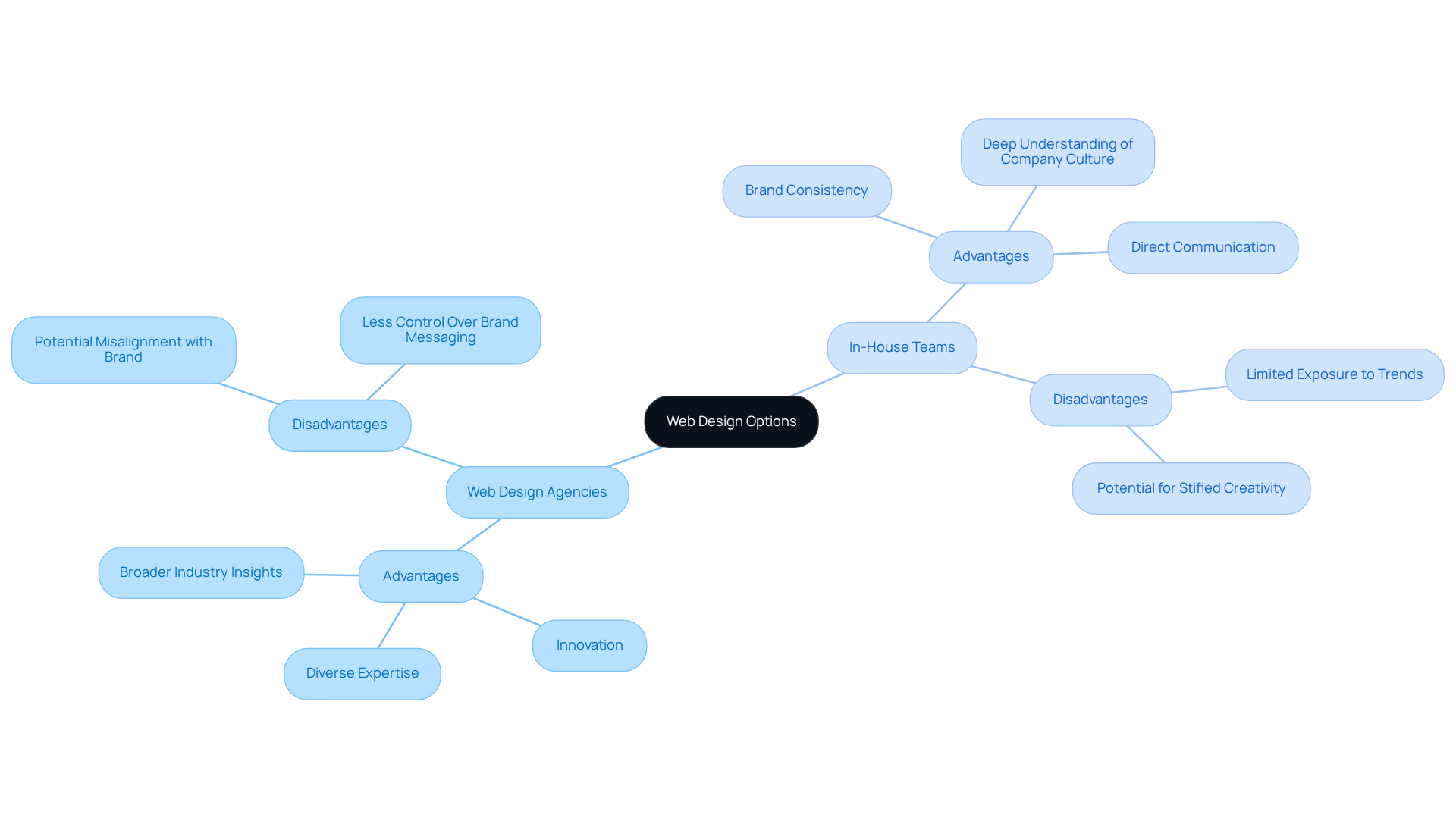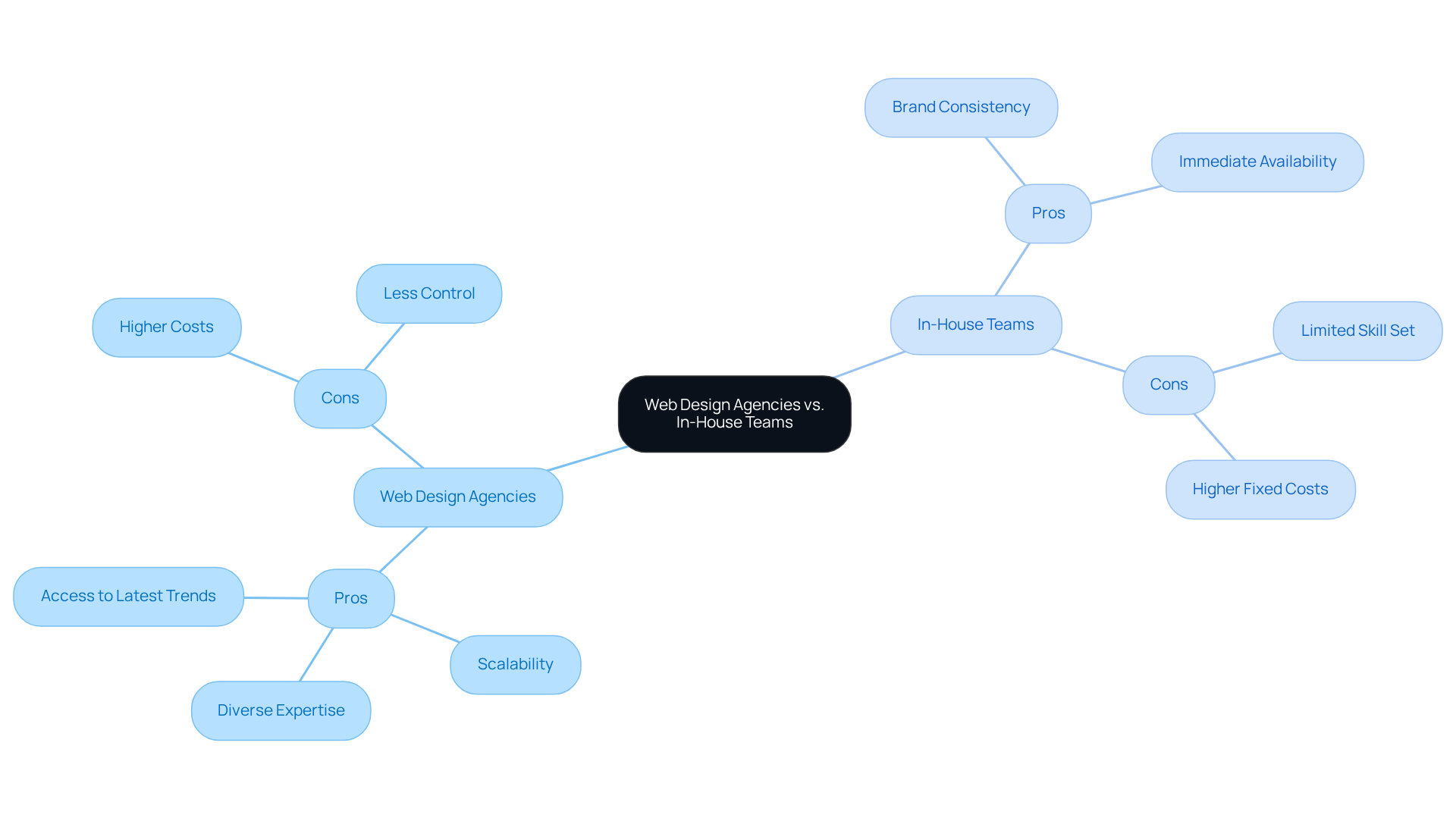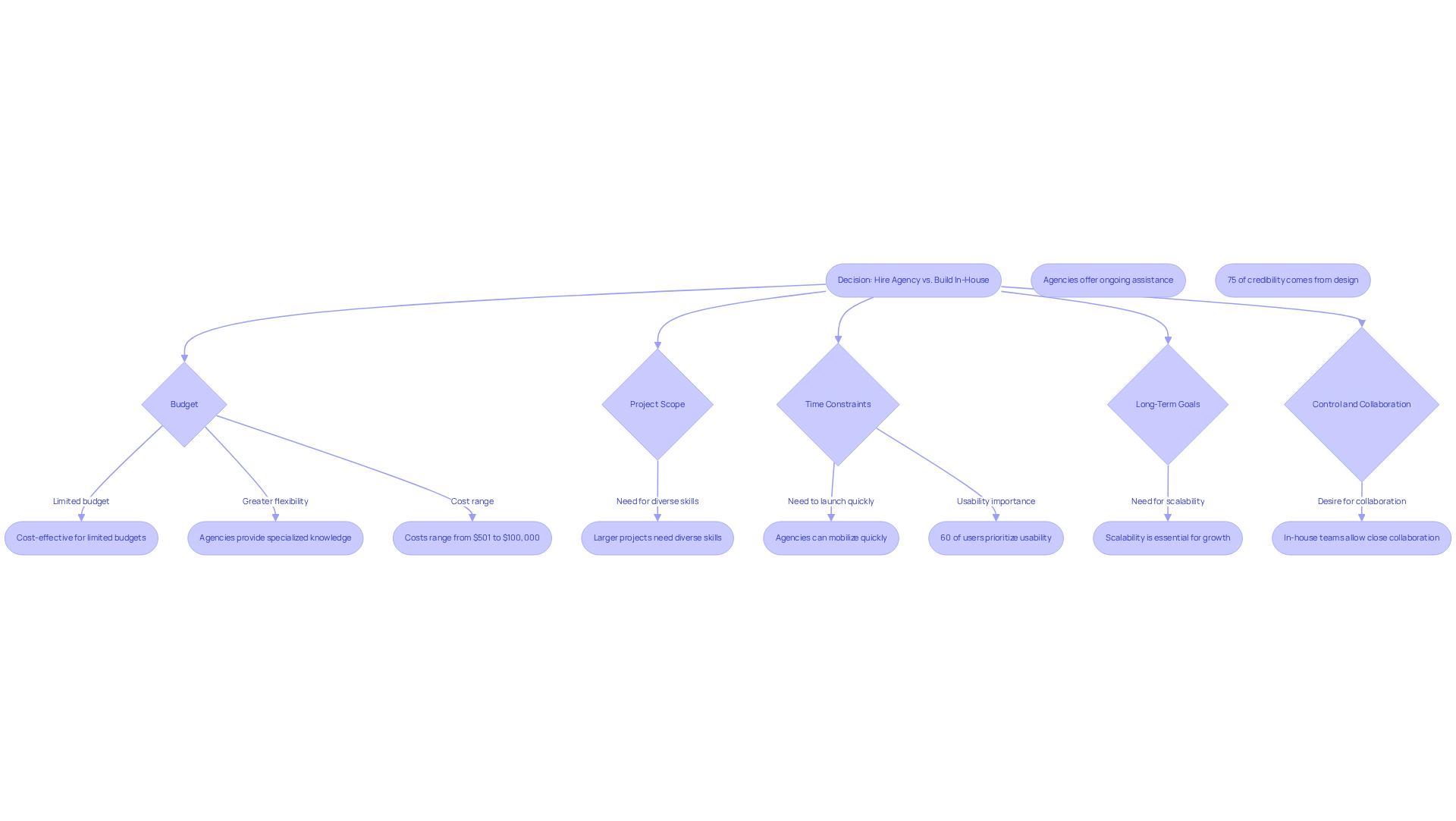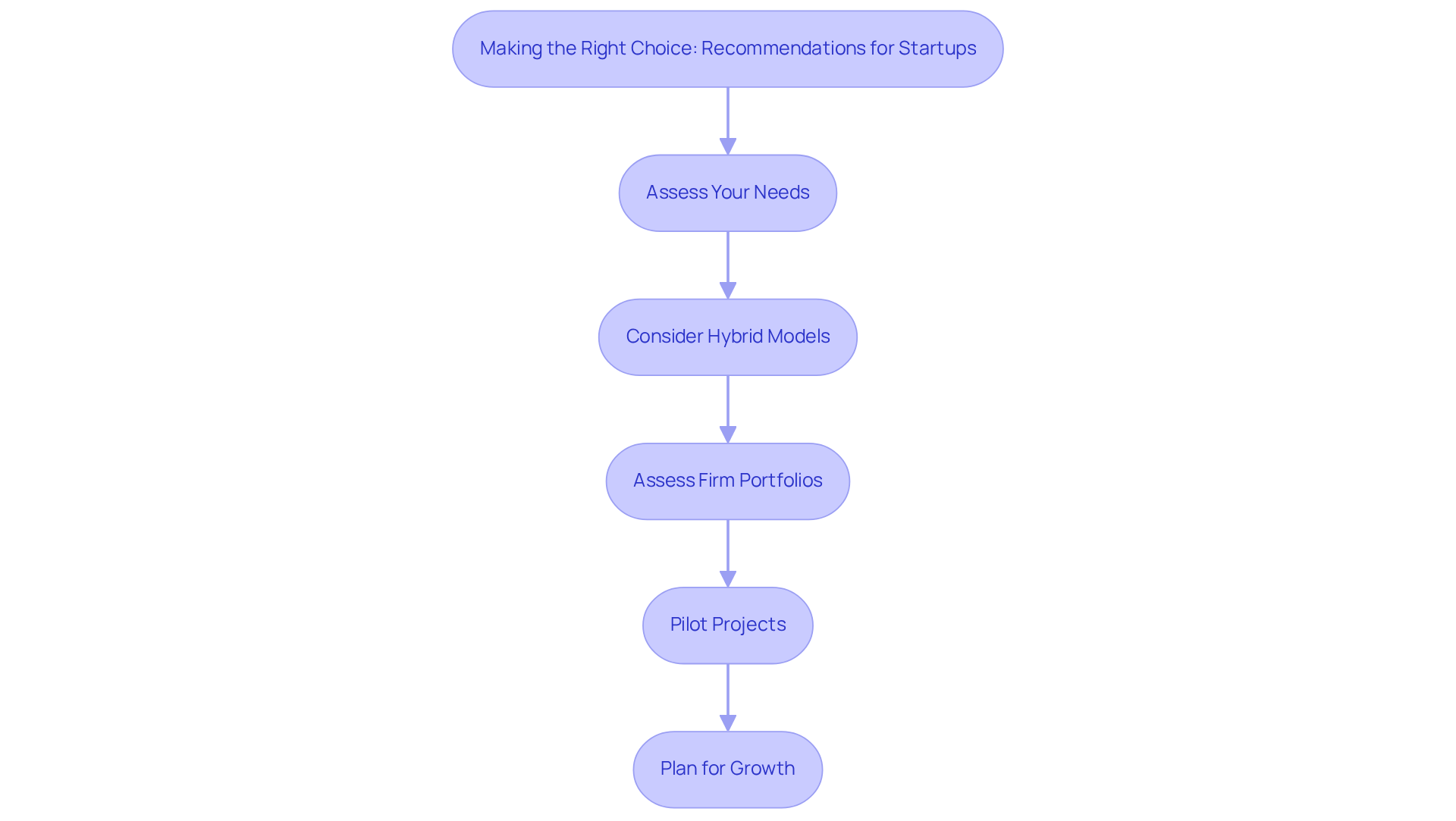Overview
Choosing the right path for your tech startup can feel overwhelming, especially when it comes to deciding between web design agencies and in-house teams. This decision carries significant weight, as it impacts not only your brand's image but also its growth trajectory. Many founders find themselves torn between the diverse expertise and scalability that agencies offer and the brand consistency and immediate availability provided by in-house teams. It's a dilemma that can stir up anxiety and uncertainty.
As you navigate this choice, it's essential to reflect on your startup's unique needs and circumstances. What are your budget constraints? What are your long-term goals? These questions are crucial in assessing which option aligns best with your vision. Remember, it’s not just about the immediate benefits; it’s about cultivating a partnership that will support your journey in the long run.
Ultimately, the best decision is one that resonates with your startup's values and aspirations. Take the time to weigh the pros and cons, and don't hesitate to reach out for guidance. You’re not alone in this process, and there are resources available to help you make an informed choice. Embrace this opportunity to shape your startup’s future with confidence and clarity.
Introduction
Navigating the choice between engaging web design agencies and developing in-house teams can feel like a daunting crossroads for tech startups. Each path is filled with unique advantages and potential pitfalls, and it’s completely understandable to feel overwhelmed.
Startups can benefit from the creative expertise and innovative solutions that agencies provide, while internal teams offer the promise of brand consistency and immediate responsiveness. Yet, this decision is not without its challenges—how can founders confidently determine which option aligns best with their vision and operational needs?
By delving into the nuances of each approach, startups can make informed choices that pave the way for sustainable growth and a meaningful digital presence. Remember, you’re not alone in this journey; many founders have faced similar dilemmas, and together we can explore the best path forward.
Defining Web Design Agencies and In-House Teams
Many tech startup founders grapple with the decision of whether to engage webdesign agenturen or rely on an in-house team. This choice can feel overwhelming, especially when considering the unique needs of their brand. The reality is that webdesign agenturen serve as external partners dedicated to crafting websites and digital experiences tailored to diverse clients. They bring together a rich tapestry of designers, developers, and strategists, each contributing their unique insights from various industries. This collaborative approach can foster innovation and creativity that may be harder to achieve within the confines of a single company's culture.
On the other hand, in-house teams offer the advantage of deep alignment with a company's specific branding and design needs. They immerse themselves in the company's culture and objectives, which can lead to a cohesive brand message. However, this focus might also limit their exposure to broader industry trends and practices, potentially stifling creativity and growth.
The challenge lies in balancing these two approaches. Webdesign agenturen often provide a wider range of services and expertise, which can be invaluable for startups looking to make a significant impact in a competitive market. Yet, internal teams can ensure consistency and control over brand messaging. Understanding these dynamics is crucial for founders who want to navigate this decision with confidence.
At RNO1, we recognize the emotional weight of these choices and are here to support you. Our agency is committed to blending expertise with empathy, ensuring that your unique vision is realized while also keeping you connected to the latest trends and innovations in web development. Together, we can create a digital experience that resonates with your audience and reflects your brand's true essence.

Pros and Cons of Web Design Agencies vs. In-House Teams
Pros and Cons of Web Design Agencies vs. In-House Teams
Pros of Web Design Agencies:
- Diverse Expertise: Agencies come together with teams that possess a wide range of skills and experiences. This diversity fosters innovative solutions and fresh perspectives that webdesign agenturen can implement to truly elevate a startup's brand.
- Scalability: They provide the flexibility to adjust resources quickly based on project demands. This adaptability is especially beneficial for startups that may experience fluctuating workloads.
- Access to Latest Trends: Webdesign agenturen are often at the forefront of industry trends and technologies, ensuring that their designs remain modern and competitive.
Cons of Web Design Agencies:
- Higher Costs: Engaging an agency can often lead to higher expenses compared to maintaining an in-house team, particularly for long-term projects. Startups may find that costs can escalate quickly, impacting their budgets. For instance, working with a UX agency may be less expensive than hiring an in-house designer due to SOW parameters.
- Less Control: Startups might experience reduced oversight of the creative process. This can lead to misalignment with their brand vision, making it harder to make timely adjustments when needed.
Pros of In-House Teams:
- Brand Consistency: In-house teams are more likely to uphold a consistent brand voice and vision, as they are deeply integrated into the company culture and values.
- Immediate Availability: They can respond swiftly to changes and feedback, facilitating a more agile creation process that aligns closely with the startup's evolving needs.
Cons of In-House Teams:
- Limited Skill Set: In-house teams may not possess the diverse expertise found in agencies, which could result in less innovative solutions. This limitation can hinder their ability to tackle complex creative challenges effectively.
- Higher Fixed Costs: Maintaining a full-time workforce can be financially challenging, especially for new businesses with limited budgets. The fixed costs associated with salaries and benefits can strain resources, particularly during lean periods.
As we look toward 2025, new businesses must thoughtfully consider these elements. The decision between online development firms and internal groups can significantly influence their growth path and overall achievement. Moreover, data shows that 66% of users desire brands to tailor messaging to their needs, highlighting the importance of understanding client expectations in this decision-making process.

Evaluating Suitability for Tech Startups: Key Considerations
When tech startups confront the decision of hiring a web design agency versus building an in-house team, it's essential to reflect on several critical factors that can deeply impact their journey:
-
Budget: For startups with limited financial resources, in-house teams can often be a more cost-effective choice over time. Yet, those with greater financial flexibility might find value in the specialized knowledge that agencies provide. The typical expense of employing a web design firm ranges from $501 to $1,000 annually, but it's important to recognize that web design expenses can escalate to $100,000 depending on the project's objectives and strategy. This broader range offers a more comprehensive view of potential expenses, inviting startups to consider what aligns best with their financial reality.
-
Project Scope: When it comes to larger projects that demand a diverse set of skills, agencies are often better equipped. They can swiftly assemble specialized teams tailored to the project's unique requirements, which is particularly beneficial for new ventures aiming to introduce intricate digital products. In fact, 73% of companies invest in web design agencies to create unique, engaging brands, highlighting the importance of specialized skills within agency teams.
-
Time Constraints: In a fast-paced environment, startups may feel the pressing need to launch their products quickly. Agencies typically have the resources to mobilize rapidly, while in-house teams might require additional time to ramp up, especially if they are newly formed. Considering that 60% of users view website usability as the most crucial element when shopping online, the urgency for new businesses to introduce efficient layouts quickly cannot be overstated.
-
Long-Term Goals: It's vital for startups to consider their future development needs. Web design agencies can offer ongoing assistance and scalability, which are essential for new businesses anticipating growth. Conversely, internal teams may need to recruit additional members as creative demands increase, potentially leading to delays. It's crucial to recognize that companies forfeit 35% of potential income due to inadequate user experience, highlighting the importance of maintaining consistent quality in aesthetics as startups expand.
-
Control and Collaboration: Startups that prioritize close collaboration and oversight of the development process may find themselves leaning towards in-house teams. On the other hand, those open to a more hands-off approach might discover that agencies are a better fit, allowing them to focus on essential business activities while leveraging external expertise. Additionally, 75% of a company's credibility stems from its site’s design, emphasizing the significance of a well-managed design process.
In summary, the choice between an external service and an internal group truly depends on a startup's specific needs, financial limitations, and long-term aspirations. By thoughtfully weighing these factors, new enterprises can make informed decisions that resonate with their growth strategies, paving the way for a successful future.

Making the Right Choice: Recommendations for Startups
Making an informed decision between webdesign agenturen and an in-house team can feel overwhelming for tech startups. To navigate this journey, consider these heartfelt recommendations:
-
Assess Your Needs: Begin by clearly defining your project requirements, budget, and timeline. Understanding these elements is crucial for aligning your choice with your strategic goals. Remember, effective project management is key; the US Bureau of Labor Statistics reveals that project managers in the tech industry earn an average of $98,580 per year, highlighting the importance of aligning resources with your business objectives.
-
Consider Hybrid Models: Embracing a hybrid approach can be a game-changer. It allows startups to engage a firm for specific projects while keeping an in-house team for ongoing needs. This flexibility can enhance your responsiveness to market changes. As TechRepublic notes, "Hybrid models allow companies to scale their resources efficiently, adapting to the fast-paced demands of the tech industry."
-
Assess Firm Portfolios: When evaluating a firm, take the time to thoroughly review their previous work. Ensure their aesthetic aligns with your brand vision and objectives. Successful collaborations often stem from a shared understanding of project goals. A study by AgencyAnalytics found that 77.2% of marketing firms offer website creation and maintenance services, underscoring the importance of assessing expertise in this area.
-
Pilot Projects: Consider launching a small pilot initiative to gauge the organization's capabilities and communication style. This trial can provide valuable insights into their workflow and responsiveness, helping to mitigate risks before committing to larger engagements. For instance, a technology firm that collaborated with a design firm for a pilot project reported a 30% increase in user engagement, showcasing the effectiveness of this approach.
-
Plan for Growth: Lastly, factor in your long-term growth strategy. If you anticipate rapid scaling, partnering with webdesign agenturen may provide the flexibility needed to adapt quickly to evolving demands and opportunities in the market. The global project management software market is projected to grow at a CAGR of 15.7% until 2030, emphasizing the need for startups to remain agile and responsive to industry trends.
By thoughtfully considering these recommendations, you can empower your startup to make choices that resonate with your vision and foster growth in a supportive environment.

Conclusion
Navigating the choice between web design agencies and in-house teams can feel overwhelming for tech startups striving to create a strong digital presence. This pivotal decision carries distinct advantages and challenges, each capable of shaping a startup's journey in significant ways. By delving into the nuances of both approaches, founders can make more informed choices that resonate with their unique vision and operational needs.
The article underscores the diverse expertise and scalability that web design agencies offer, which can be especially advantageous for startups experiencing fluctuating demands and in search of innovative solutions. On the other hand, in-house teams foster a deep alignment with brand values and provide immediate availability, though they may not possess the broad skill set that agencies typically bring. Founders must consider key factors such as:
- Budget
- Project scope
- Time constraints
- Long-term goals
as they navigate this important decision-making process.
Ultimately, we encourage startups to thoughtfully evaluate their specific needs and explore hybrid models that harness the strengths of both agencies and in-house teams. This approach can enhance responsiveness to market dynamics and cultivate a creative environment that drives growth. By making this decision with care, startups not only position themselves for immediate success but also lay the foundation for sustainable development in an ever-evolving digital landscape.
Frequently Asked Questions
What are web design agencies?
Web design agencies are external partners that specialize in crafting websites and digital experiences tailored to various clients. They consist of a team of designers, developers, and strategists who bring diverse insights from different industries.
What are the benefits of using a web design agency?
Web design agencies provide a collaborative approach that can foster innovation and creativity, offering a wider range of services and expertise that can be invaluable for startups aiming to make a significant impact in a competitive market.
What are the advantages of having an in-house team?
In-house teams have a deep alignment with a company's specific branding and design needs. They immerse themselves in the company's culture and objectives, which can lead to a cohesive brand message.
What are the potential downsides of in-house teams?
While in-house teams offer brand consistency, they may have limited exposure to broader industry trends and practices, which can potentially stifle creativity and growth.
How can startups decide between using a web design agency and an in-house team?
Startups should consider the balance between the innovative potential of web design agencies and the brand consistency offered by in-house teams. Understanding their unique needs and objectives is crucial in making this decision.
How does RNO1 support startups in their web design choices?
RNO1 blends expertise with empathy, helping startups realize their unique vision while keeping them connected to the latest trends and innovations in web development, thereby creating a digital experience that resonates with their audience.




